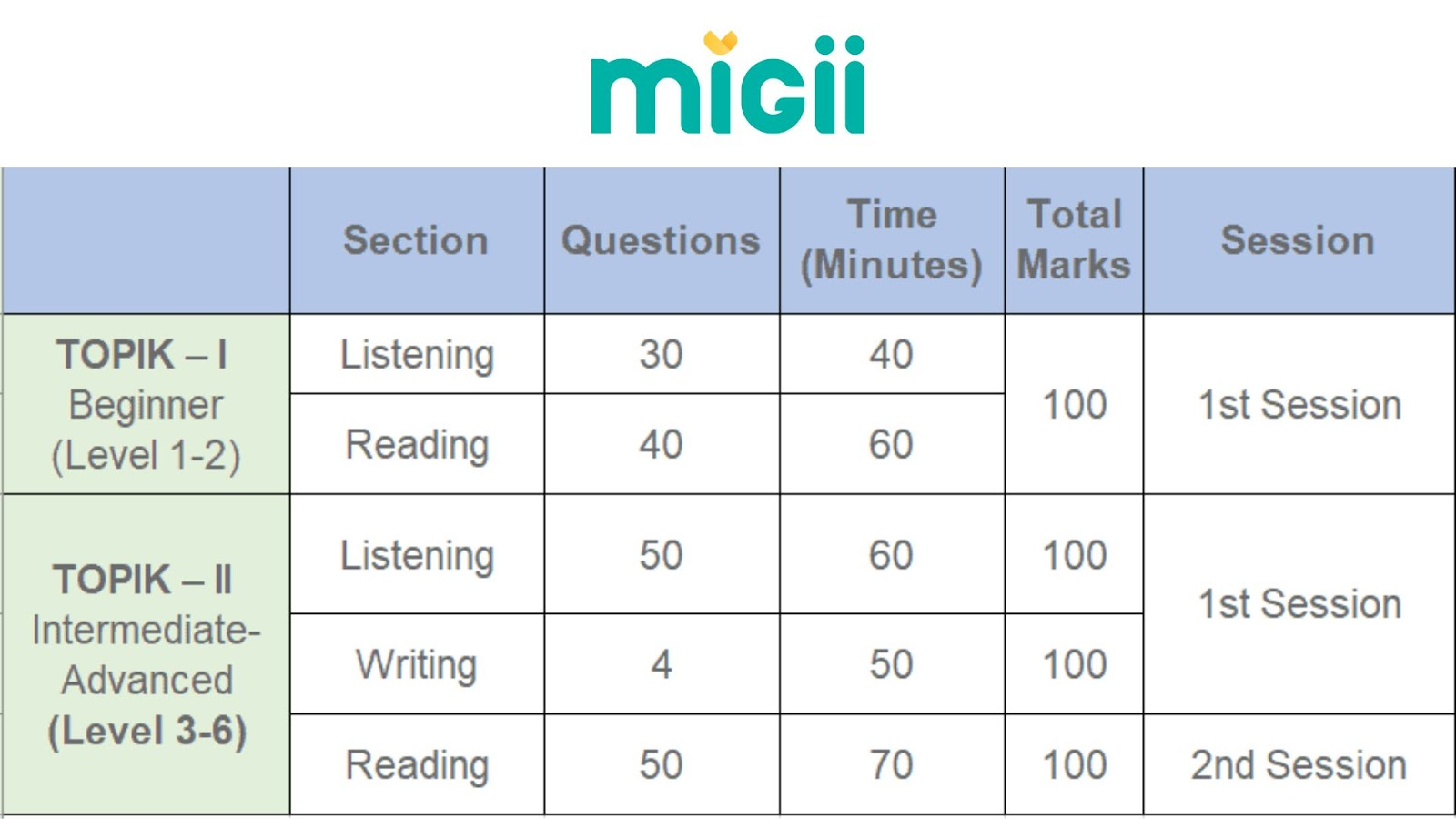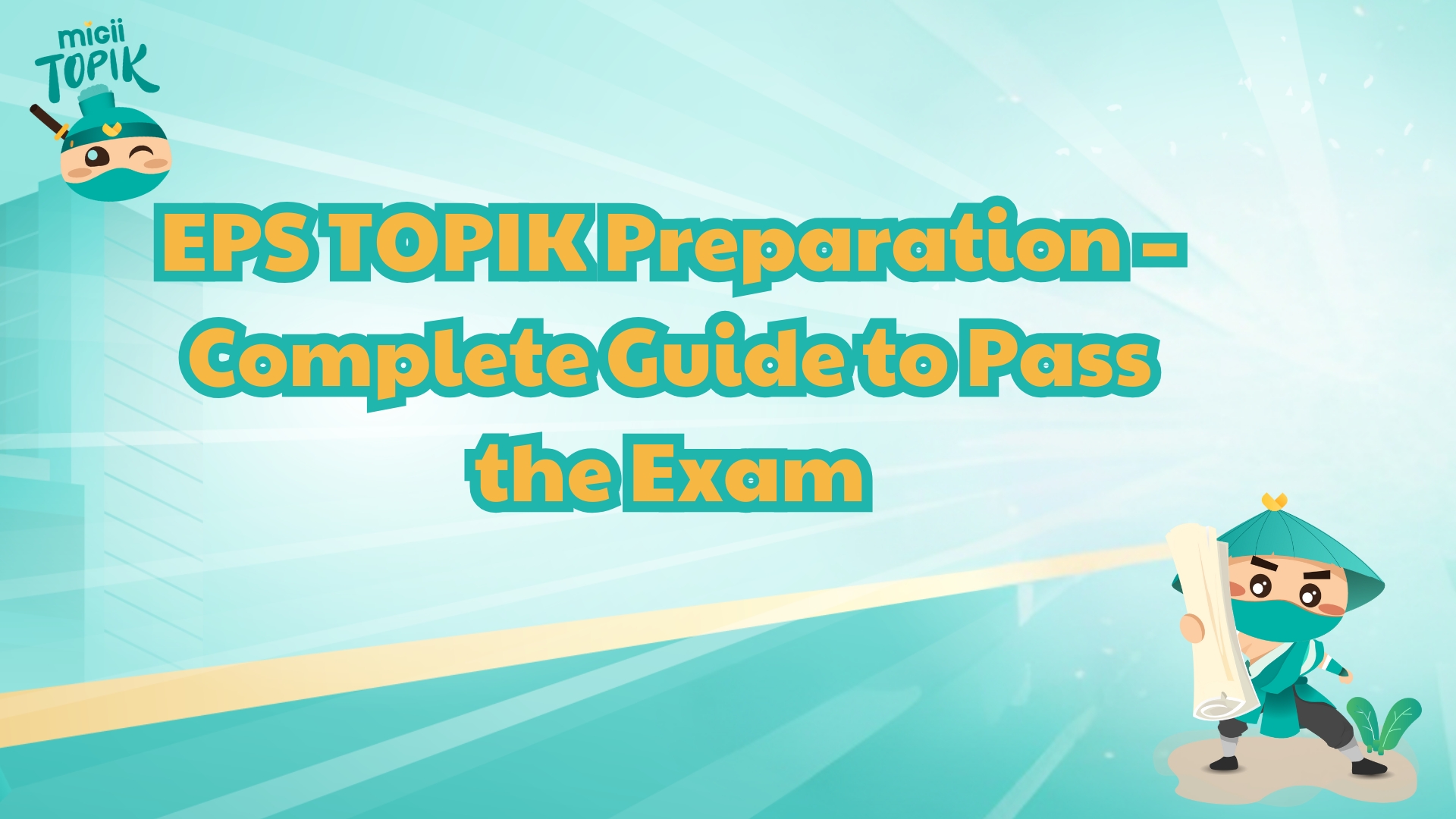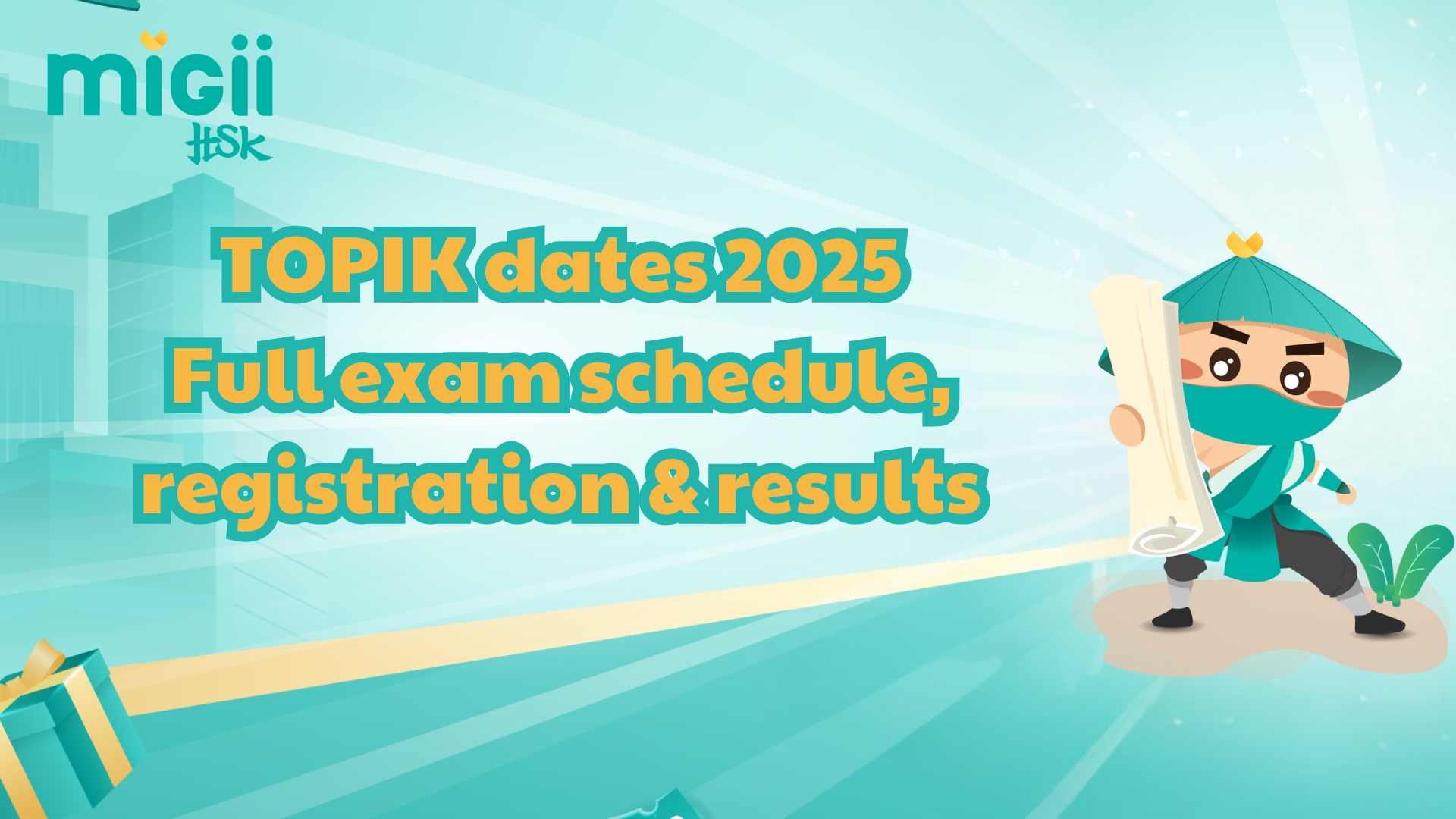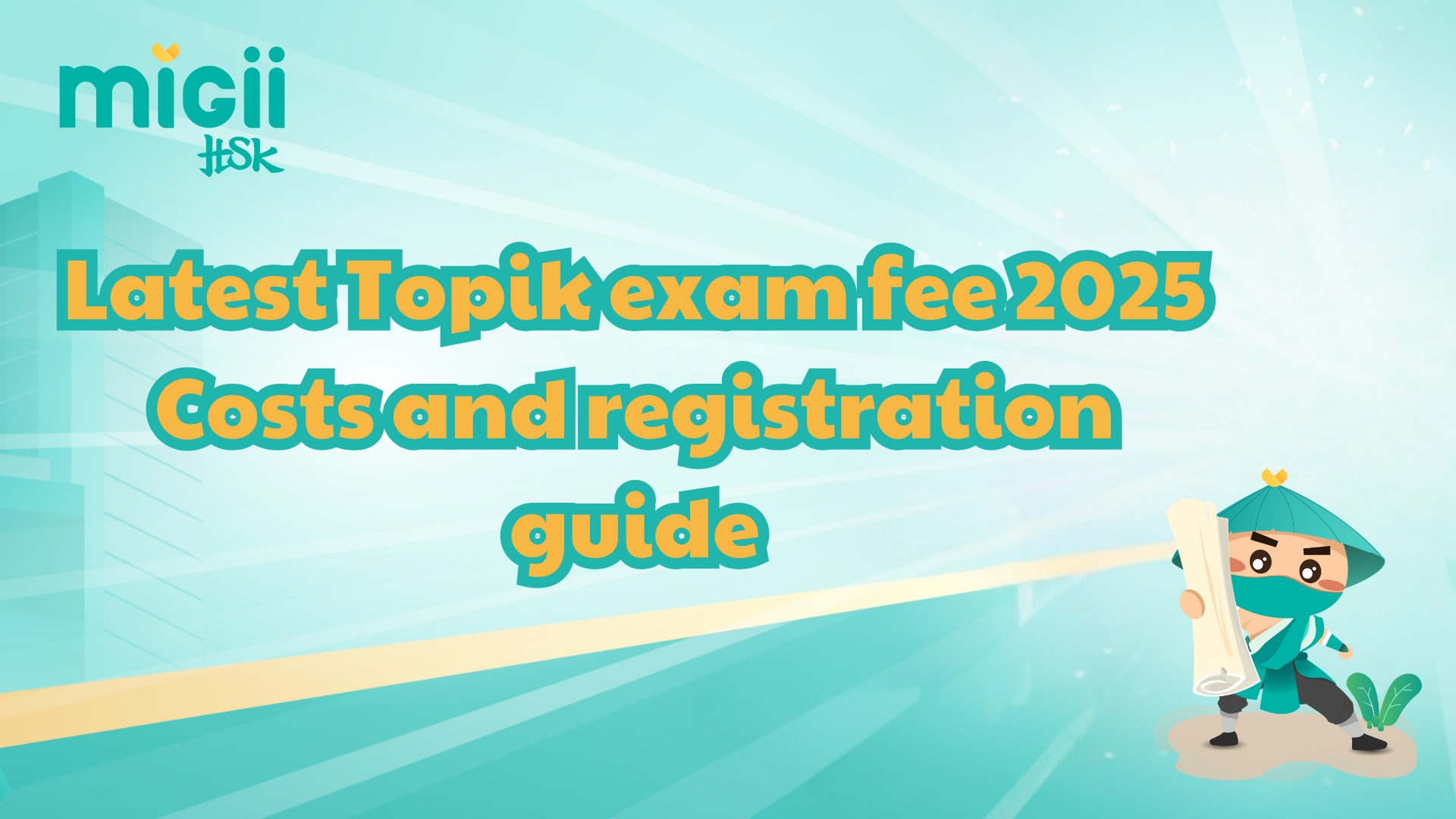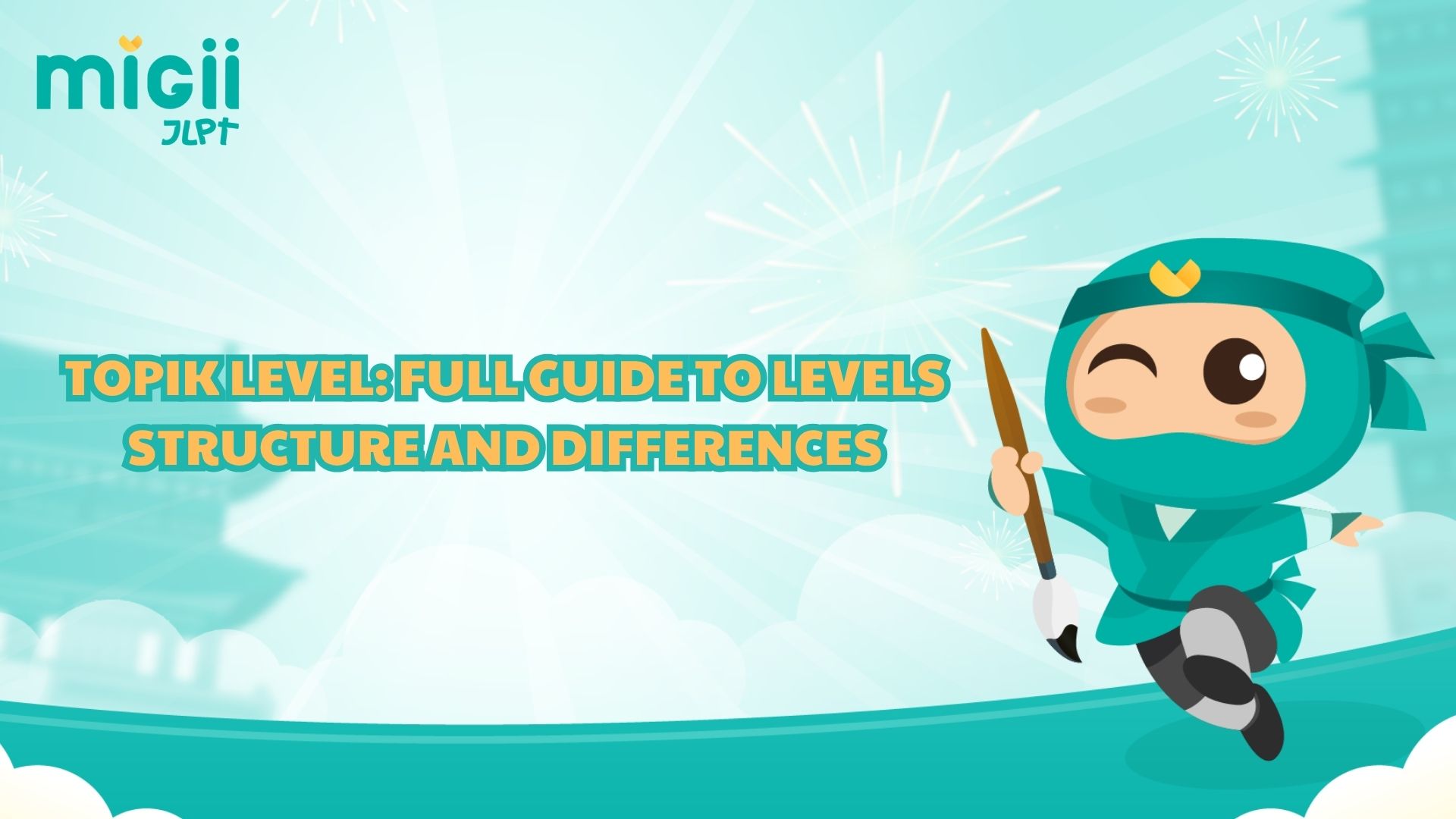The TOPIK (Test of Proficiency in Korean) exam is one of the important certificates for those who plan to study abroad, work or settle in Korea. In addition to practicing grammar, vocabulary and test-taking skills, understanding the TOPIK exam time plays a key role in helping candidates actively review and allocate time appropriately in the exam room.
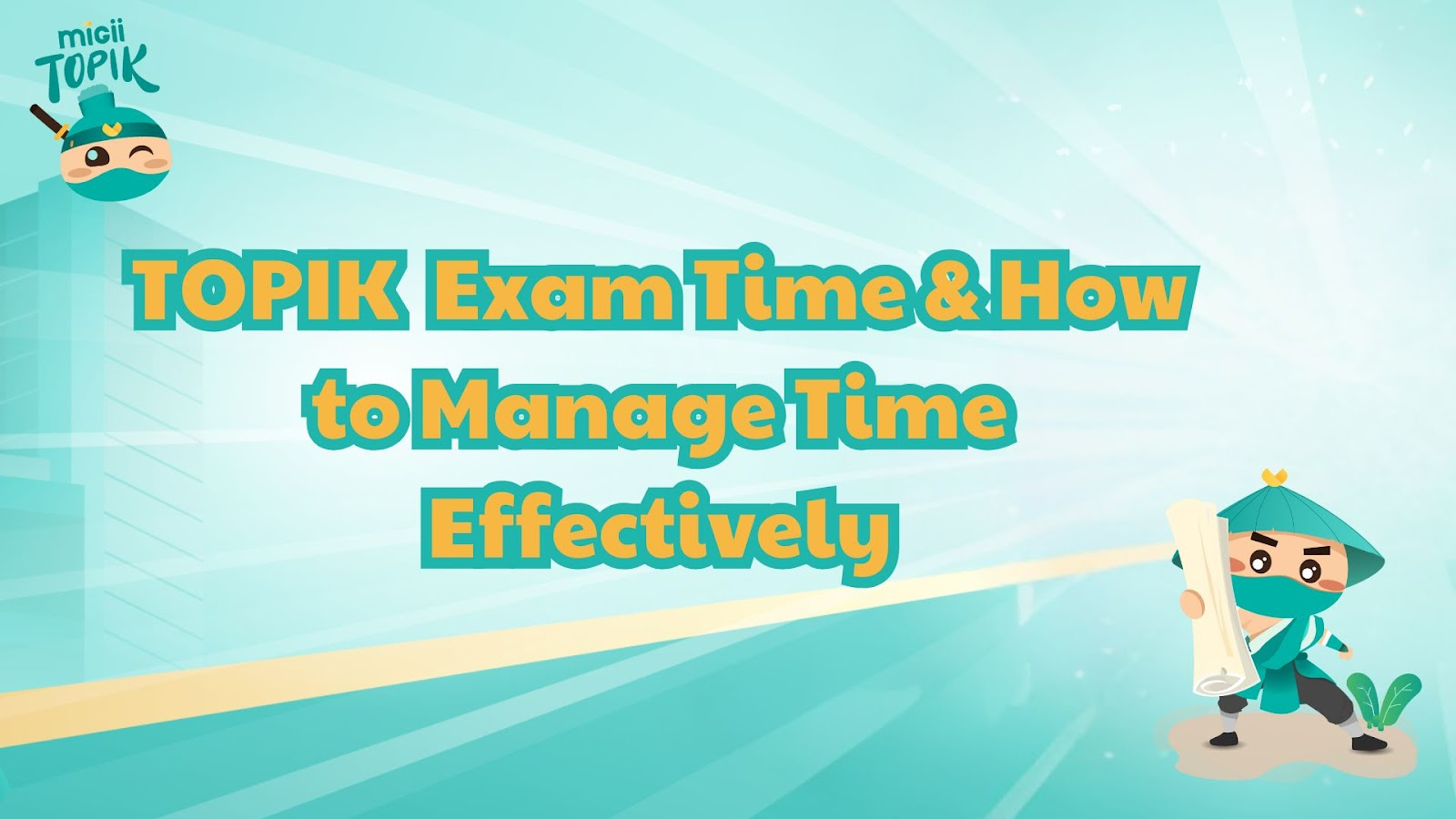
Topik exam time
Introduction to the TOPIK (Test of Proficiency in Korean) exam
TOPIK is a Korean language proficiency test organized by the National Institute for International Education (NIIED), designed to assess the Korean language skills of learners worldwide. The TOPIK certificate is commonly used for:
- Applying for admission to universities in Korea.
- Applying for jobs at Korean companies.
- Immigration procedures or job applications in Korean-speaking environments.
Understanding the TOPIK exam time helps candidates plan their practice more effectively, closely simulating real test conditions. This prevents common issues such as working too slowly, skipping questions, or running out of time during the exam — problems that many first-time test takers often face.
TOPIK Exam Time – Detailed Duration of Each Test Section
The TOPIK exam is divided into two levels — TOPIK I (Beginner) and TOPIK II (Intermediate–Advanced) — and each has its own structure and time allocation. Understanding the duration of each section is essential for proper time management during the test.
All About TOPIK Test - The Complete Guide
TOPIK I (Beginner Level)
TOPIK I is designed for learners at the basic level (Level 1–2). The test consists of two sections: Listening and Reading. There is no writing section at this level.
|
Section |
Number of Questions |
Time Allocation |
|
Listening |
30 |
40 minutes |
|
Reading |
40 |
60 minutes |
- Total time: 100 minutes
- Format: Multiple-choice questions only
- Tip: Since all questions are multiple-choice, candidates should practice listening carefully to short dialogues and reading simple passages quickly to avoid running out of time.
TOPIK II (Intermediate – Advanced Level)
TOPIK II is intended for intermediate to advanced learners (Level 3–6). It includes Listening, Writing, and Reading sections.
|
Section |
Number of Questions |
Time Allocation |
|
Listening |
50 |
60 minutes |
|
Writing |
4 |
50 minutes |
|
Reading |
50 |
70 minutes |
- Total time: 180 minutes
- Format: A combination of multiple-choice and written answers. The writing section includes both short-answer and essay questions.
- Tip: Time management is especially important in the writing section. Practicing under timed conditions can help improve both speed and accuracy.
Why Knowing the Exam Time Matters
Many candidates, especially those taking the test for the first time, underestimate how quickly time passes during the exam. By familiarizing themselves with the TOPIK exam time, candidates can design a realistic study and mock test schedule. This helps them build stamina, stay focused, and avoid common mistakes like leaving questions unanswered or rushing through sections at the last minute.

Why Knowing the Exam Time Matters
The specific TOPIK exam time determines when you need to be at the test center, the order of the sections you will take, and how you should plan your day to succeed in the exam.
TOPIK Exam Schedule During the Year & Important Dates
TOPIK exam schedule internationally & in Vietnam (usually 6 times/year)
The TOPIK exam is held multiple times each year, both in South Korea and at various international test centers. The National Institute for International Education (NIIED) usually organizes the exam six times annually — typically in January, April, May, July, October, and November. However, the exact schedule may vary slightly each year, so it’s important for test takers to check official announcements in advance.
Outside of Korea, the exam is usually offered twice a year — commonly in April and October. These two test sessions are open to candidates around the world through authorized institutions such as universities, language centers, and Korean cultural centers.
- Registration period: Typically opens 2–3 months before the test date.
- Results announcement: Usually 4–5 weeks after the test.
- Tip: Seats at international test centers can fill up quickly, so early registration is strongly recommended.
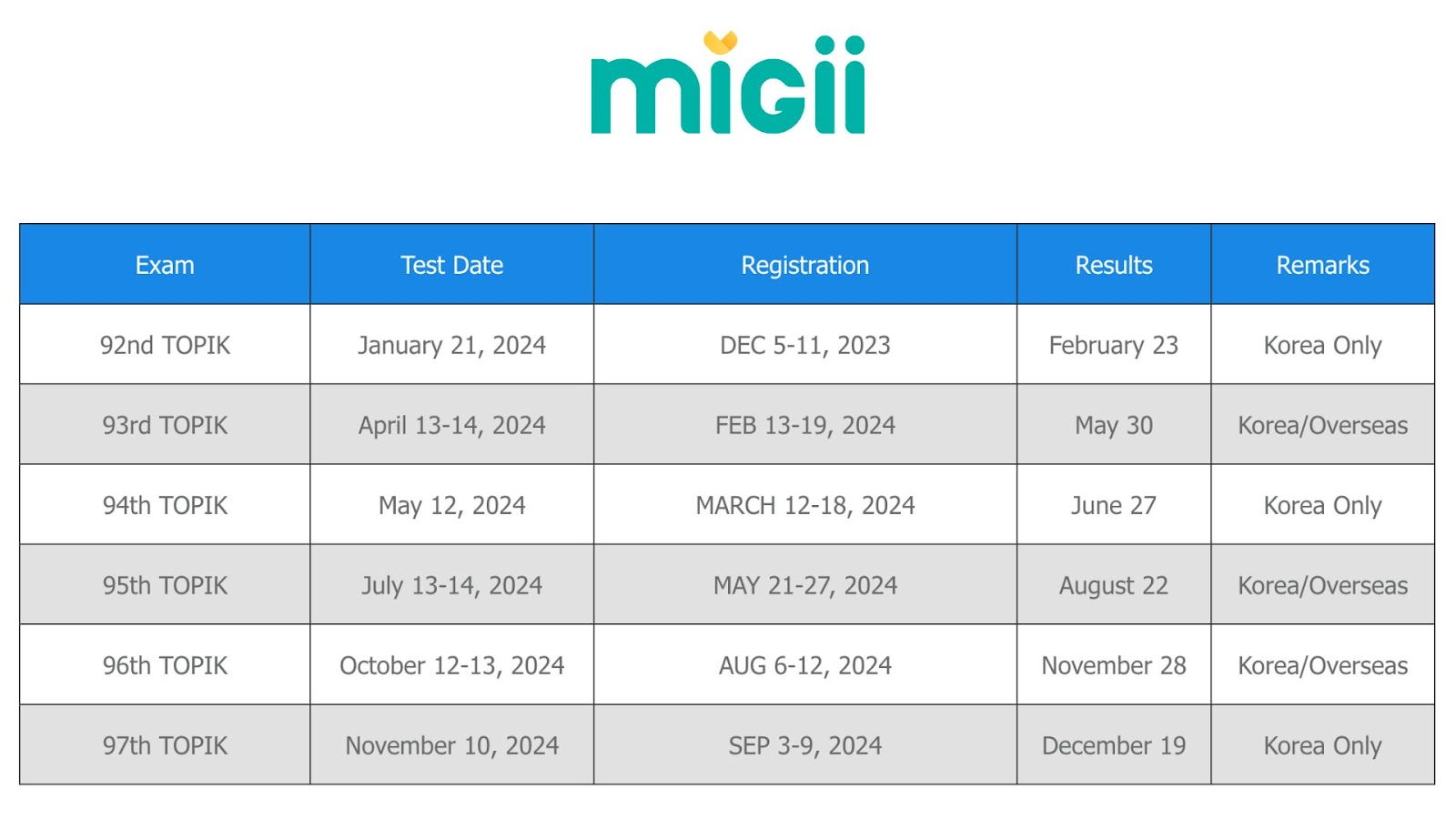
TOPIK exam schedule internationally & in Vietnam
In Vietnam, the TOPIK exam is organized more frequently — usually six times a year, following NIIED’s official schedule. Test venues are located in major cities such as Hanoi, Ho Chi Minh City, Da Nang, and some other provinces with authorized institutions.
- Test months: January, April, May, July, October, and November.
- Application process: Registration is done directly through the assigned test centers. Each center may have its own procedure, so candidates should regularly check their announcements.
- Demand: Due to the large number of test takers in Vietnam, registration often reaches capacity early. It’s advisable to prepare documents and register as soon as the application period opens.
Time for registration, exam and result announcement
The registration, exam, and result announcement times for TOPIK vary by test edition, so you must check the official schedule for each specific test, such as the TOPIK IBT 9, which has its registration from September 04 to September 10, 2025, the exam on September 25, 2025, and results on October 02, 2025. For the next upcoming test, TOPIK IBT 10, registration is from October 07 to October 13, 2025, with the test held on November 22, 2025, and results announced on November 28, 2025.
Paper-Based TOPIK in Vietnam (102nd Test)
For the 102nd TOPIK Test (Paper-based in Vietnam), the registration period is scheduled from July 28–30, 2025, depending on the city. However, the exact test date and result announcement have not been specified in the available information. Candidates should check the official websites regularly for updates.
TOPIK Internet-Based Tests (IBT)
|
Test Edition |
Registration Period |
Test Date |
Result Announcement |
|
TOPIK IBT 7 |
Not specified |
June 14, 2025 |
July 04, 2025 |
|
TOPIK IBT 8 |
Not specified |
September 13, 2025 |
October 02, 2025 |
|
TOPIK IBT 9 |
Sept 04 – Sept 10, 2025 |
September 25, 2025 |
October 02, 2025 |
|
TOPIK IBT 10 |
Oct 07 – Oct 13, 2025 |
November 22, 2025 |
November 28, 2025 |
To make sure you don’t miss any important deadlines, follow these reliable sources:
- Visit the IIG Việt Nam website – This is the official source for TOPIK test schedules and registration details in Vietnam.
- Check the “Exam Plan” section – Look for “TOPIK IBT” or specific test numbers (e.g., TOPIK IBT 8, 9, 10) to find the exact registration, exam, and result dates.
- Review the “News” section – Updates regarding the 102nd test or other upcoming exams are often posted here first.
Time Management Tips for the TOPIK Exam
Effective time management plays a crucial role in achieving a high TOPIK score. Many candidates lose valuable points not because they lack knowledge, but because they fail to allocate their time wisely. The following tips will help you stay on track during the test and make the most of every minute.
- Practice with real timing conditions:
When preparing for the exam, always solve past papers or mock tests under the official TOPIK time limits. This helps improve your speed, concentration, and ability to handle pressure, making the actual test feel more familiar.
- Prioritize easy questions first:
Go through the exam quickly and answer all the questions you find easy. Then, return to the more difficult ones. This strategy ensures that you secure as many points as possible before spending extra time on challenging questions. - Use a timer during practice:
Training with a stopwatch or timer is one of the most effective ways to build a natural sense of pacing. It helps you learn how much time you can afford to spend on each section without rushing at the end. - For the Writing section (TOPIK II): manage time in clear stages:
Divide your time into three parts — outlining, writing, and reviewing. Spend the first few minutes planning your structure and main ideas, the majority of your time writing, and reserve the final minutes to check grammar, spelling, and coherence. This approach improves both accuracy and clarity.

Time Management Tips for the TOPIK Exam
By applying these time management techniques consistently during practice, candidates can enter the exam room with greater confidence, avoid common time-related mistakes, and maximize their final score.
How to prepare and analyze effectively the time before this TOPIK exam
A well-structured study plan and smart time management are essential for achieving good results in the TOPIK exam. By preparing strategically before the test day, you can improve both speed and accuracy, while reducing stress during the actual exam.
Plan your study schedule based on the official time frame
Start by building a realistic study plan that mirrors the actual TOPIK exam structure and timeline. This helps you get familiar with the real testing conditions and avoid surprises on the exam day.
Next, allocate your practice time according to each skill — Listening, Reading, and Writing (for TOPIK II). Focusing on all areas ensures balanced improvement and prevents you from neglecting weaker sections.
Finally, create a weekly or daily timetable to stay consistent. A clear schedule helps you study more efficiently and avoids the stress of last-minute cramming before the exam.
Familiarize yourself with the real test format
Start by practicing with past TOPIK papers, especially from recent test sessions. This helps you understand the structure, question patterns, and difficulty levels, making the actual exam feel more predictable.
Practice recent TOPIK tests: Familiarize yourself with the test structure, question types, and time limits to improve your speed and test-taking strategies.
Here are some sample test download links:
>> https://drive.google.com/drive/folders/1kSgJ1q9yts5h9eCMUY4yMQUkGirZtrpk
Use a timer during practice to recreate the pressure and pacing of the real test. Training under timed conditions improves your speed, concentration, and ability to manage each section effectively.
While practicing, take notes on the sections where you often run out of time. Analyzing these problem areas allows you to adjust your study plan and focus your training on specific skills that need the most improvement.
Use breaks wisely and keep your focus on test day
- Prepare all necessary materials in advance (e.g., pens, pencils, ID documents) to avoid unnecessary stress.
- Use the short breaks between sections to relax your mind lightly, stretch a bit, or take deep breaths.
- “Reset” your mindset quickly after each section to stay sharp and perform consistently throughout the entire test.
By analyzing your time usage during preparation and simulating the real test environment, you’ll enter the exam room with stronger time control, better concentration, and greater confidence to achieve your desired TOPIK score.
Understanding the TOPIK exam time is essential for effective preparation, and with the support of Migii Center, candidates can stay updated on official schedules and practice under real exam conditions to achieve higher scores. Regular practice under real exam time conditions helps build speed, accuracy, and confidence — all of which are essential for top performance on test day.
